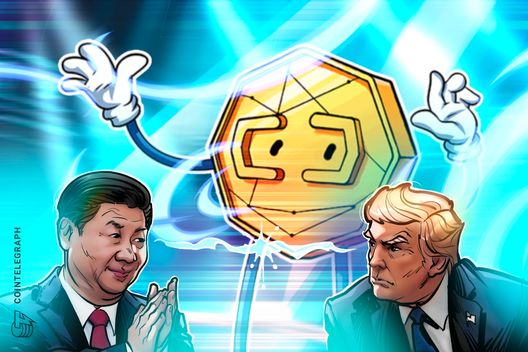
US-China Trade Talks: A Pivotal Moment for Crypto Markets?

In a development closely scrutinized by financial centers worldwide, including the ever-watchful cryptocurrency sector, U.S. President Donald Trump has traveled to South Korea. The purpose: a high-stakes encounter with Chinese leader Xi Jinping, focused on defusing the escalating trade tensions and tariffs that have recently sent jitters through the global economy. These strained relations between the world’s two largest economies haven't just unsettled traditional markets; they’ve also played a discernible role in the recent volatility experienced by digital assets.
The Ripple Effect of Global Trade Friction
For several months, the U.S. and China have been embroiled in a contentious trade dispute, marked by the imposition of reciprocal tariffs on hundreds of billions of dollars in goods. This strategic maneuver by the Trump administration, initiated to address perceived unfair trade practices and intellectual property issues, has evolved into a significant economic standoff. Its ramifications are widespread, disrupting international supply chains, elevating production costs, and fostering an environment of uncertainty that discourages investment and dampens consumer confidence globally. Economists increasingly voice concerns about the potential for these tensions to trigger broader economic slowdowns.
Such an atmosphere of apprehension inevitably spills over into financial markets. While traditional safe-havens like gold typically benefit, the unique nature of this trade war has created complex dynamics where even established assets face pressure, making nascent markets like crypto particularly sensitive to shifts in investor sentiment.
How Tariffs Tied Into Crypto's Recent Dip
Despite being championed as decentralized and independent from traditional financial systems, cryptocurrencies like Bitcoin are not immune to global macroeconomic forces. The ongoing trade conflict, by influencing overall investor confidence and market liquidity, has had a tangible impact on the crypto market. Periods of intensified tariff threats or actual tariff implementations have often coincided with noticeable downturns in the prices of Bitcoin and other digital currencies this month.
This correlation stems from several factors. Primarily, heightened global economic uncertainty triggers a "risk-off" mentality among investors. Both retail and institutional participants tend to withdraw capital from assets perceived as higher risk – a category into which crypto often falls, despite its long-term growth potential. Additionally, the trade war can affect the U.S. dollar's strength and global capital flows. An economic slowdown in key regions, exacerbated by tariffs, also impacts a significant portion of the global crypto community, potentially affecting demand and trading volumes.
While many in the crypto community hope Bitcoin can ultimately act as a digital "safe haven" during economic turmoil, its recent reaction to trade escalations suggests the market still largely views it as a growth asset, susceptible to broader shifts in sentiment and capital allocation.
Prospects for a Crypto Rebound: A Resolution in Sight?
The meeting between President Trump and President Xi holds considerable sway. A positive outcome – even an initial agreement to ease tensions or commit to further detailed negotiations – could inject a much-needed wave of optimism into global markets. Such a resolution would likely bolster investor confidence, stimulate capital deployment, and potentially set the stage for a recovery across various risk assets, including cryptocurrencies.
For the crypto market, this could translate into renewed investor interest, reduced selling pressure, and a potential price rebound as participants feel more secure in allocating funds to growth-oriented digital assets. Stability in traditional finance often creates a more conducive environment for crypto, signaling clearer paths for institutional investors eyeing larger stakes.
The Peril of Protracted Tensions
Conversely, the path to a comprehensive resolution is notoriously challenging. Should the talks in South Korea fail to yield substantive progress, or worse, lead to further escalation, the global economic forecast would undoubtedly darken. In such a scenario, markets would likely react negatively, with continued pressure on equities and significant volatility for nascent asset classes like crypto.
A prolonged trade war would solidify the risk-off sentiment, encouraging a flight from volatile assets. While some purists maintain that sustained economic instability might eventually underscore Bitcoin's "store of value" attributes, the immediate consequence would likely be increased price fluctuations and downward pressure as market liquidity tightens and risk aversion becomes the dominant theme.
Navigating Crypto's Future in a Connected World
As the world awaits the outcome of this pivotal Trump-Xi meeting, the cryptocurrency market stands at a critical juncture. Its recent performance vividly illustrates its increasingly complex relationship with global macroeconomic forces. While its foundational independence remains a core appeal, its short-term price movements are undeniably influenced by the intricate dance of traditional finance and geopolitics.
Ultimately, whether the digital asset space can truly decouple from these broader pressures is a question for the long term. For now, all eyes are on South Korea, where the decisions of two leaders could significantly shape the trajectory of global trade – and, by extension, cryptocurrency market sentiment.
Keywords: Crypto
